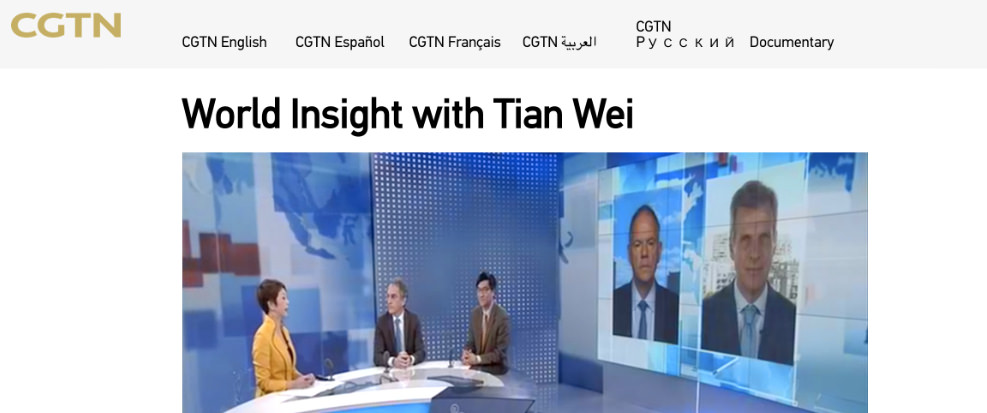
Bruno Roche Analyses the Global Economy on Chinese Television
Published January 2019
Bruno Roche participated in a televised panel discussion focussed upon the 2018 G20 Summit in Buenos Aires that took place on 30th November and 1st December. The broadcast was filmed in Beijing and hosted by Tian Wei on CGTN, a Chinese international English-language news channel that reaches more than 85 million viewers in over 100 countries.
The panel was comprised of experts who offered their analysis of the Summit’s theme – building consensus for fair and sustainable development in the areas of trade and investment, digital economy, infrastructure and climate change. Bruno made a number of incisive and thought-provoking comments. The highlights have been transcribed below.
‘We are 10 years after the financial crisis and despite hundreds of initiatives, books, forums… we are still in the situation where it is society in service of the economy and the economy in service of finance. The role of finance has not been sorted out yet and I think one of the major challenges we are going to face over the next decade… is the dysfunction of the financial system, which is the root of many of the issues we deal with, such as inequality and global warming.’
‘The context changed profoundly over the last 20 years. Power shifted from government to business. Also, power shifted from the traditional economy to the digital economy. So, we have new players now in the context in which we operate. Therefore, the relationship between these powers –nation states and large organisations – has to be organised differently. It is my hope that there will be a framework that brings this power together, but you can’t put new wine into old wineskin. To some extent, the old system had a purpose for a time, but it needs to be reformed profoundly.’
‘Many multinational corporations now have a GDP that is higher than many nation states. So, there is a new form of power coming up that needs to be organised to the same level that nation states are organised. We cannot ignore these players because these players, to some extent, have more power and influence than many nation states because they are truly operating on a global level. Many nations are limited to playing within their borders. Multinational corporations are the true players of globalisation.’
‘Most importantly, we need to interrogate the principle that will eventually drive the reorganisation of globalisation. At the moment, we are back in a system that is pretty much based on competition and also on the rise of nations against nations. I strongly believe that there is a higher level of organisation, that is based on reciprocity and mutuality… that can drive the world – business and nations – into a higher place of peace and prosperity.’
‘Financial capitalism is based on one principle, which is the maximisation of profit at the expense of the other. We are reaching the end of this model, because not only is it no longer effective… but it starts to be destructive. Revisiting the modes of profit construction at the level of a business unit from the smallest business unit to the largest multinational corporation is a way to question the purpose of prosperity and the vision of inclusive growth.’
Other panelists
Dr. Jiong Gong
Professor of Economics
University of International Business and Economics (UIBE)
View profile →
Geoffrey Garrett
Dean, The Wharton School
Reliance Professor of Management and Private Enterprise
View profile →
Martín Redrado
Former President of the Central Bank of Argentina
View profile →
Photo: cgtn.com
Other Articles
Asia Economics of Mutuality Forum 24-25 April 2024
The first Economics of Mutuality forum to be held in Asia, this event will explore how the Economics of Mutuality model can empower cross-sector actors to address the challenges presented by ageing demographics in Asia, such as strained pension and healthcare systems and a shrinking workforce.
Oxford Virtual Executive Education Program 2 May – 20 June 2024
Driving Impact Through Mutual Value Creation, an 8-week online course brought to you by Oxford University’s Saïd Business School and the Economics of Mutuality team, will equip you to walk the talk of Stakeholder Capitalism.
Nordic Economics of Mutuality Forum October 15-16
The first Economics of Mutuality forum to be held in Scandinavia, this event taking place October 15-16, 2024 will be hosted by Brandinnova, the Center for Brand Research at the Norwegian School of Economics (NHH), Jæren Sparebank, and the Economics of Mutuality Foundation.
How Witnessing an Economy of Greed Led Me to Pursue an Economy of Good
Tony Soh is CEO of the National Volunteer & Philanthropy Centre (NVPC) in Singapore. In this interview, he tells us how his experience of the global financial crisis led him to search for better ways of doing business. A graduate of the Oxford Economics of Mutuality Virtual Executive Education Program, he is working to build a movement around corporate purpose in his city



